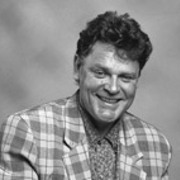
Neil Roberts
Neil Roberts began his career as a print and television journalist, then founded independent production company Communicado, whose varied output ranged from a run of popular magazine-style shows (That's Fairly Interesting, Magic Kiwis) to classic movie Once Were Warriors.
Over his career Roberts would establish a reputation for fostering and encouraging talent, including producer Julie Christie, journalists Carol Hirschfeld and Anita McNaught, and presenter Mikey Havoc. In 1997 Roberts returned to his old stomping grounds at Television New Zealand, as the organisation's Television Manager, before passing away the following year.
Roberts grew up in the North Island town of Wanganui, where his father ran a machinery business. At the age of 16 he became a cub reporter at the local newspaper. Journalism would take him to Fleet Street in London, and to the parliamentary press gallery; he was writing and sub-editing for music magazine Melody Maker the year Hendrix and Jim Morrison died. After returning to NZ, Roberts joined The Auckland Star, then spent a year in radio.
In 1975 he began working in state television. Three years later Roberts began filing stories for flagship current affairs show Eyewitness, including this piece on punk music (Eyewitness News came later). At Eyewitness he "learned about writing, directing and producing, and loved it".
In 1981, after criticism from Prime Minister Robert Muldoon, Roberts' employers broadcast an apology over an Eyewitness report by him which examined the merits of National Education Minister Merv Wellington, and opposition spokesman Russell Marshall. Roberts quit in disgust, after expressing that disgust to his superior with legendary gusto.
He began making corporate videos in 1984 with his then wife, ex-Eyewitness reporter Karen Sims. Contrary to some accounts, which draw a direct line from closing the door on TVNZ to kickstarting his own television empire, Roberts later argued that creating an independent company was an accident, caused partly by rising volumes of work.
Communicado — which began in the mid-80s — soon grew to become one of the country's most successful independent production companies, at one point employing more than 100 people (not all fulltimers), with offices in Auckland, Wellington and Singapore. Although corporate videos were a key earner, Communicado was also one of the first independent companies to specialize in popular factual TV programming.
Roberts was chairman, working initially alongside company directors Robin Scholes (who would stay with the company longer than anyone), Garry McAlpine, and Neil's brother Murray Roberts. In 1994 Paul Holmes also became an investor. According to Roberts' third wife, lawyer Karen Soich, the company name was a play on the idea that Soich was "incommunicado". It also sounded better than the alternative, Combined Communications.
Communicado's productions ranged across business and tourism videos, advertising, and a run of magazine programmes and TV documentaries. Some of the company's work — like the Roberts-narrated ANZ Magic Minutes spots — blurred traditional lines between advertising and journalism.
TV shows included Heroes, Mud and Glory, That's Fairly Interesting, Magic Kiwis, and New Zealand at War, an account of New Zealand's role in WWII. In the process Communicado's television work developed a reputation for being energetic, upbeat, and for some, unashamedly populist. Roberts riposte to high-brow critics was that television and journalism are ultimately about clarity, and that "a lot of people mistake simplicity and clarity for being downmarket".
In 1988 he hosted a chat show for TVNZ, It's Only Wednesday. His guests included Robert Muldoon. Roberts would go on to write and direct a controversial and critical two-part documentary on the former Prime Minister, subtitled The Grim Face of Power (1993). The following year Communicado released its first feature, Kiwi cinematic landmark Once Were Warriors. Scholes produced. Cross-cultural romance Broken English followed in 1996. Although lesser known at home, it also won solid audiences, and impressive reviews overseas.
Thirteen ideas-filled years after launching what had become Communicado, Roberts sold his stake in the company, arguing he needed a rest. Communicado went through a series of changes of management and investors, before merging with Australian production company Screentime. These days the Screentime title has taken centre-stage.
As for Roberts, plans for some time off were swiftly abandoned, after he heard of a major job opportunity. In 1997 he rejoined TVNZ as Television Manager. As part of the job application, he wrote a 50-page vision paper advocating more New Zealand content across the board: the title was "Great New Zealand Television". He hoped to bring "creative energy" and change to TVNZ.
Once installed, Roberts closed the loss-making Horizon regional stations, and tried to attract younger viewers with an MTV channel, through which he introduced radio host Mikey Havoc to television. Roberts set about changing TVNZ's management structure, while returning to old traditions of designating a specific programmer for each channel.
His TVNZ reign was controversial, and he quit in April 1998, after conflicts with the chair of the TVNZ board. Neil Roberts died of cancer on 8 November of that year. He was 50.
Profile written by Ian Pryor; published on 4 February 2009
Sources include
Warren Barton, Obituary of Neil Roberts - The Dominion, 9 November 1998
Paul Smith, 'Roberts ankles TVNZ' - Variety, 22 April 1998
Paul Smith, 'Neil Roberts' - Variety, 14 December 1998
Karyn Scherer, 'Once they were warriors .... now they produce the goods' - The NZ Herald, 30 June 2000